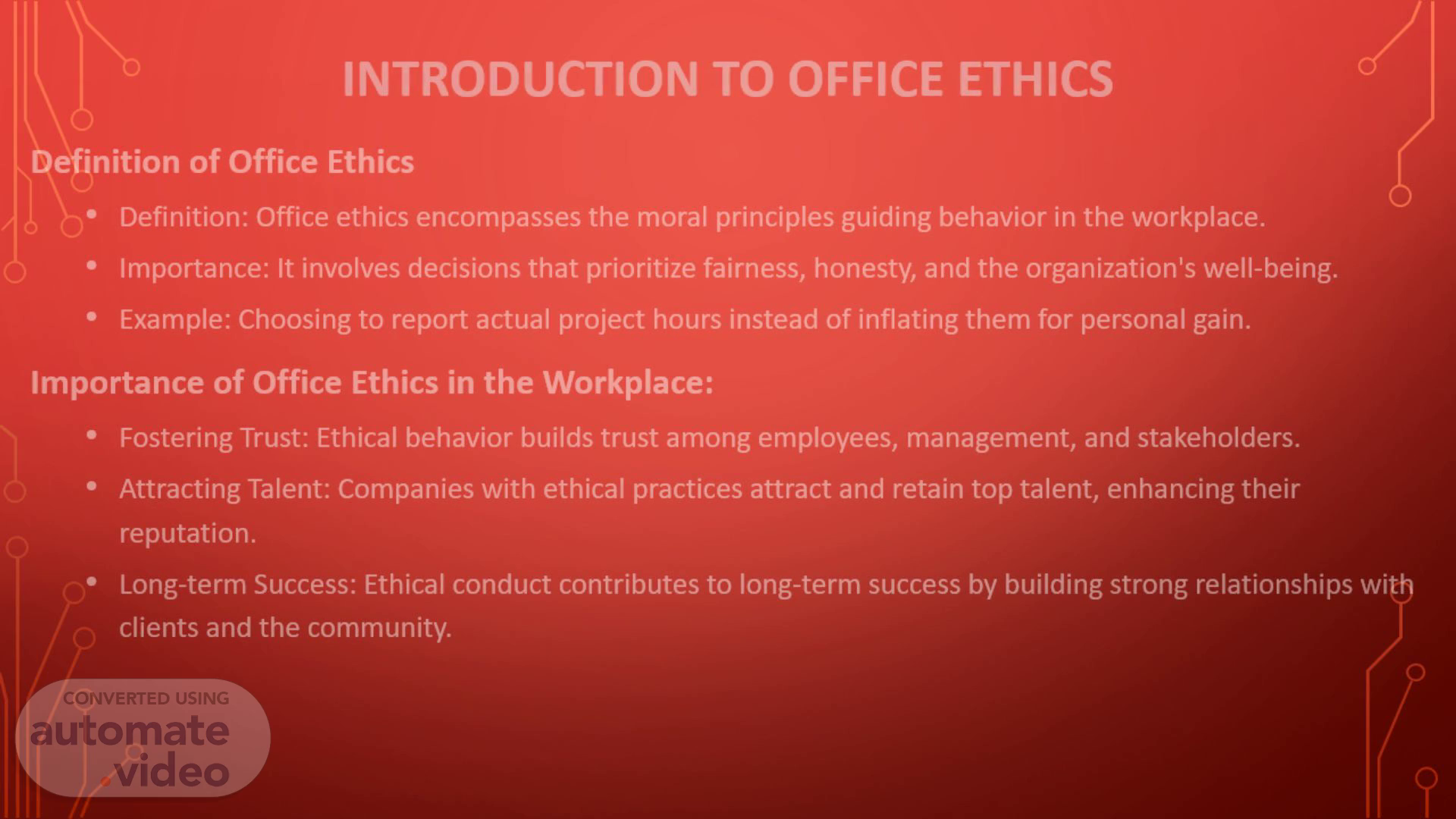
Introduction to Office Ethics
Scene 1 (0s)
[Audio] Welcome to today's presentation on "Understanding Office Ethics." Office ethics refers to the moral principles guiding behavior in the workplace, emphasizing decisions that prioritize fairness, honesty, and the well-being of the organization. Consider the scenario where an employee chooses to report actual project hours instead of inflating them for personal gain—an exemplary display of office ethics. Ethical behavior is foundational, fostering trust among employees, management, and stakeholders. Companies with strong ethical practices not only attract top talent but also contribute to long-term success by building robust relationships with clients and the community..
Scene 2 (43s)
[Audio] In our exploration of key aspects, we begin with "Integrity and Honesty." Truthfulness and transparency are fundamental, building trust among team members and with clients or customers. Imagine a manager openly communicating project challenges, fostering collaboration and trust among the team. Moving to "Respect and Fairness," fair treatment of employees promotes a positive and inclusive workplace culture. Clear policies against discrimination ensure equal opportunities for all employees. Another critical aspect is "Confidentiality," where employees must protect sensitive information, fostering a culture of trust within the organization..
Scene 3 (1m 27s)
[Audio] Now, let's delve into common ethical dilemmas. "Conflicts of Interest" require employees to recognize situations where personal interests may conflict with professional responsibilities. Managers may need to maintain objectivity by recusing themselves from decisions involving close relationships. Use of Company Resources" emphasizes responsible utilization for productivity. Misuse, such as using company resources for personal gain or sharing confidential information, breaches ethical standards. "Whistleblowing" is encouraged through safe reporting systems, and protection for whistleblowers reinforces a culture of accountability..
Scene 4 (2m 12s)
[Audio] Shifting gears, we explore how to build a positive ethical culture. Leadership plays a crucial role, setting examples and establishing clear guidelines. Ongoing employee training ensures a shared understanding, reinforcing ethical principles and motivating employees through recognition. "Open Communication" is key. An open environment encourages honest dialogues about ethical concerns, and accessible reporting channels ensure timely and appropriate resolution of issues. Cultivating a culture of integrity is an ongoing journey, contributing not only to the well-being of our employees but also fortifying the reputation and success of our organization. In conclusion, office ethics is not a destination but a continuous journey. Your commitment to ethical conduct is paramount in fostering a workplace where everyone can thrive. By prioritizing office ethics, we not only enhance the well-being of our employees but also fortify the reputation and success of our organization. Thank you for your attention and dedication to fostering a culture of integrity in our workplace..
Scene 5 (3m 26s)
Conclusion: Cultivating a Culture of Integrity. Key Takeaways: Office ethics is foundational to a healthy workplace, fostering trust, and supporting long-term success. Employees play a crucial role in upholding ethical standards through integrity, respect, and responsible use of resources. Identifying and addressing common ethical dilemmas, such as conflicts of interest and whistleblowing, contributes to a resilient ethical culture. Building a Positive Ethical Culture: Leadership sets the tone by exemplifying ethical behavior and establishing clear guidelines. Ongoing employee training reinforces ethical principles and ensures a shared understanding across the organization. Open communication channels empower employees to voice concerns, promoting transparency and accountability. The Road Ahead: Cultivating a culture of integrity is an ongoing journey. By prioritizing office ethics, we not only enhance the well-being of our employees but also fortify the reputation and success of our organization. Thank You! Your commitment to ethical conduct contributes to a workplace where everyone can thrive. Thank you for your attention and dedication to fostering a culture of integrity in our organization..